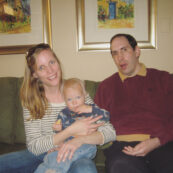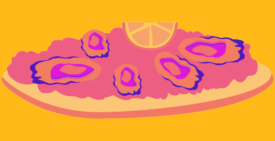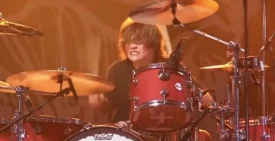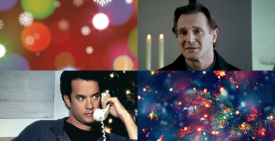
When it comes to disability stories, popular culture tends to perpetuate a few narratives: A disability is delivered from above as a gift or a curse. The person living with a disability has to triumph in some way, score the game-winning point, and live happily ever after. Or, conversely, they become an object of pity and charity. Meanwhile, the able-bodied people in the story learn some deeper lesson, as though the disability exists to make us all better, more enlightened people.
While it’s true that adversity can inspire and teach us, the reality is that disability intersects with a lot of grief and heartache, too – especially when the condition is life-altering or leads to premature death. This was certainly the case for me and my brother Alan, who had a rare genetic disability called Prader-Willi Syndrome and died suddenly at age 43.
Alan was one of the kindest, funniest, most open-hearted people I’ve ever known. But his condition also led to cognitive delays, violent mood swings, and severe food issues that made every day with him a struggle. I loved Alan deeply, and I also feared him. I worried constantly about his well being. When he died, I grieved not only the loss of my big brother, but the loss of possibility that things could be different for him, (and for us).
When you love and lose someone who had a disability of any kind (visible or invisible), people don’t see or understand the secondary losses – the older, chronic ones that come rushing in behind the initial wave of grief. As you open the door to the initial wave of grief, all the older, chronic losses come rushing in behind it.
Here are five common experiences related to disability and loss that no one prepares you for:
Anticipatory grief starts young
Growing up alongside someone with a disability or chronic medical condition means you learn to brace for loss early on. You might witness your person undergo painful medical procedures, hospitalizations, or hear caregivers debate their prognosis so much that it becomes a part of your subconscious. When the disability is visible, you may also watch your person endure bullying and discrimination and feel helpless to stop it. Siblings and caregivers especially report ongoing anxiety and vicarious trauma as a result. With developmental disabilities like my brother’s, there’s no set prognosis or life expectancy. Families are left to wonder and worry about how much time they have, and it’s excruciating.
Survivor guilt is real
Survivor guilt is not just about natural disasters, sudden tragedies, and accidents. Being a healthy or able-bodied survivor when a loved one with disability dies brings its own kind of guilt. It’s normal to wonder why them and not you. It’s also common for survivors and caregivers to grapple with questions like: Could I have prevented this? Should I have done more? Were there unknown treatments that could have extended their life? For me, acknowledging and validating these feelings has been helpful, but self-blame has not. Instead, I allow myself to feel anger at the randomness of the condition that limited Alan’s life and. And, I try to focus on what I can do to honor my brother with the time I have.
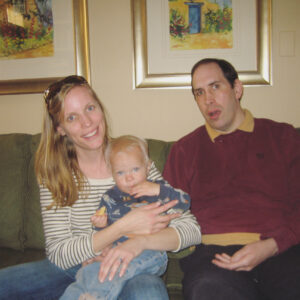
Gina, her son, and Alan in 2011
You mourn an imagined future
Disability can feel like an unwanted villian in your story, robbing your person of the future you imagined. You might mourn the loss of a carefree relationship, lost time together, the loss of freedom from worry. You grieve what should have been. I’ve often lamented the fact that my brother could not experience driving a car, going to college, living independently, falling in love, or having children. When your person with a disability dies, you inherit all their unfinished business, all their unanswered questions, all the what-ifs. You’re left to make meaning of their life – and your life with and without them in it.
You’ll never fully understand the disability experience
Additionally, survivors also grieve the fact that they’ll never fully understand the experience of having a disability. When you love someone, you want to access their interior world. You want to walk alongside them and empathize with their unique life experiences. Yet, no matter how compassionate and empathetic you are, it’s impossible to fully understand the disability experience from the outside. There’s an otherness or distance that’s baked into the relationship – and there’s grief in that, too.
Your grief may be complicated
There’s no right or wrong way to mourn any type of loss. And that’s true for those of us who’ve lost someone who had a disability. You may feel relief alongside your grief, especially if their condition caused suffering. If you were in a caregiving role, you may feel lost or untethered, wondering what now? You could feel disconnected from friends and family for a while. You may also feel pressured by some to come out the other side of your loss with some profound, shiny life lesson or a renewed sense of purpose and gratitude.
In the future, I’d love to see more disability narratives that are expansive and nuanced. I think we can allow deep love, joy, appreciation, and happy memories to exist alongside bereavement and pain. We can let disability be beautiful and difficult at the same time. In my opinion, there’s no better way to honor the complexity of your person and your relationship than to name the complexity of this kind of loss.
Gina DeMillo Wagner is an award-winning journalist and author of Forces of Nature: A Memoir of Family, Loss, and Finding Home. Her writing has been featured in The New York Times, The Washington Post, Memoir Magazine, Self, Outside, Psychology Today, and other publications. She is a winner of the CRAFT Creative Nonfiction Award, and her memoir was longlisted for the 2022 SFWP Literary prize. She lives and works near Boulder, Colorado. You can visit her online at ginadwagner.com


